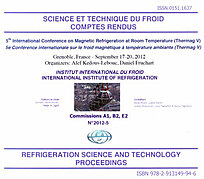
Document IIF
L'influence de divers procédés de refroidissement sur la phase, la microstructure et les propriétés magnétocaloriques des composés de LaFe(11.6)Si(1.4).
The influence of different cooling processes on phase, microstructure and magnetocaloric properties of LaFe(11.6)Si(1.4) compounds.
Résumé
These compounds are annealed at 1503 K for 5 hours and cooled down to room temperature by furnace cooling, air cooling, and quenching in ice water, respectively. The main phase is the 1:13 phase in those compounds. The impurity phase is a-Fe, and the amount of LaFeSi phase is so small that it is hard to observe in their powder X-ray diffraction patterns (XRD). The XRD and SEM show that three cooling methods have little influence on the phase relation and microstructure of LaFe11.6Si1.4 compounds prepared by different cooling processes. For studying the influence of different cooling processes on magnetic property, the Curie temperature, thermal and magnetic hysteresis, magnetocaloric effect,and relative cooling power of those compounds are investigated. The result show that the maximum ?SM (T, H) and cooling power RCP of LaFe(11.6)Si(1.4) prepared by furnace cooling are both the largest in three compounds, and the value are 18.7 J/kg.K and 164.6 J/kg under a field change of 0-2 T, respectively.
Documents disponibles
Format PDF
Pages : 109-115
Disponible
Prix public
20 €
Prix membre*
Gratuit
* meilleur tarif applicable selon le type d'adhésion (voir le détail des avantages des adhésions individuelles et collectives)
Détails
- Titre original : The influence of different cooling processes on phase, microstructure and magnetocaloric properties of LaFe(11.6)Si(1.4) compounds.
- Identifiant de la fiche : 30005483
- Langues : Anglais
- Source : 5th International Conference on Magnetic Refrigeration at Room Temperature (Thermag V). Proceedings: Grenoble, France, September 17-20, 2012.
- Date d'édition : 17/09/2012
Liens
Voir d'autres communications du même compte rendu (70)
Voir le compte rendu de la conférence
-
Magnetocaloric properties of spherical LaFeCoSi...
- Auteurs : TAKATA H., IRIE T., NAKAMURA E., et al.
- Date : 17/09/2012
- Langues : Anglais
- Source : 5th International Conference on Magnetic Refrigeration at Room Temperature (Thermag V). Proceedings: Grenoble, France, September 17-20, 2012.
- Formats : PDF
Voir la fiche
-
Magnetic refrigeration and magnetocaloric effec...
- Auteurs : HUANG J. H., CHENG J., LIU C. L., et al.
- Date : 17/09/2012
- Langues : Anglais
- Source : 5th International Conference on Magnetic Refrigeration at Room Temperature (Thermag V). Proceedings: Grenoble, France, September 17-20, 2012.
- Formats : PDF
Voir la fiche
-
The corrosion behaviour of LaFe11.6Si1.4 alloy ...
- Auteurs : TANG Y., CHEN Y., ZHANG E.
- Date : 17/09/2012
- Langues : Anglais
- Source : 5th International Conference on Magnetic Refrigeration at Room Temperature (Thermag V). Proceedings: Grenoble, France, September 17-20, 2012.
- Formats : PDF
Voir la fiche
-
Effect of hydrogenation conditions on magnetic ...
- Auteurs : WANG C., LONG Y., MA T., et al.
- Date : 17/09/2012
- Langues : Anglais
- Source : 5th International Conference on Magnetic Refrigeration at Room Temperature (Thermag V). Proceedings: Grenoble, France, September 17-20, 2012.
- Formats : PDF
Voir la fiche
-
Linearly, continuously graded transition temper...
- Auteurs : BARCZA A., ZELLMANN V., KATTER M.
- Date : 17/09/2012
- Langues : Anglais
- Source : 5th International Conference on Magnetic Refrigeration at Room Temperature (Thermag V). Proceedings: Grenoble, France, September 17-20, 2012.
- Formats : PDF
Voir la fiche
